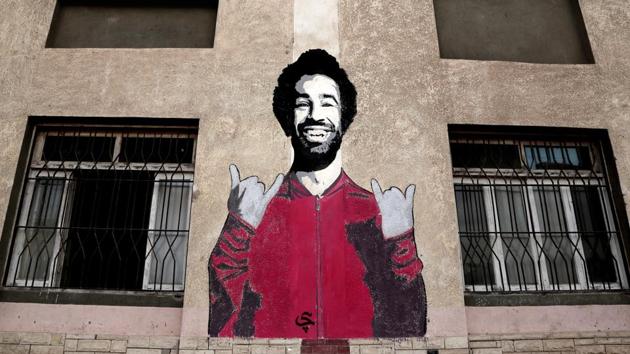In order to lead Egypt in its second World Cup match on Tuesday, Mohamed Salah is now in Russia. However, he is well-known everywhere in his nation of origin, which is a reflection of his position as one of soccer’s best players.





The mural has, if anything, worked too well. Several months ago, a massive portrait of a beaming Mohamed Salah appeared on the exterior of a street café in Cairo, tucked between images of some of Egypt’s most prominent cultural icons, including the singer Umm Kulthum and the author Naguib Mahfouz.
Soon, the location turned become a site of pilgrimage for both Egyptians seeking to celebrate Salah, the striker whose cool-headed penalty in extra time gave Egypt its first World Cup berth in 28 years, and for tourists mesmerized by his amazing play for Liverpool, his English club side.
Hani Fathy, the café’s manager, stated that it has “become very popular.” “Egyptians and visitors alike snap pictures of it. He represents Egypt in its entirety. In fact, it has become such a popular location that Fathy has had to start turning people away, despite the boost it gave to business.
Salah is napping to relax because so many people come to see it, Fathy said.



Salah is omnipresent in Cairo despite the fact that he has yet to play a game in Russia, a situation that might change when Egypt plays the hosts on Tuesday. He appears on everything from bed linens to custom Ramadan lanterns, from advertising boards for huge international corporations to handcrafted posters on street shops. His name and picture are impossible to avoid.
Whether it’s Egypt, whose chances in Russia now lie on his injured shoulder, or Liverpool, the team he helped to the Champions League final in May, his shirt has become a must-have accessory.



“People want either the national team shirt or the Liverpool shirt,” claimed Mohamed Anwar, owner of a kiosk in the heart of Cairo. Whichever doesn’t matter, he said. As long as it is inscribed with his name.
However, there are other indicators of his influence, such as the crowds that gather in Cairo’s cafes to watch his matches or the commotion that results from them when he scores.
According to Moustafa El Chiati, one of the founders of the Egyptian soccer website KingFut, Liverpool is currently the top foreign team in Egypt. Coffee bars broadcast any Liverpool game; you can tell when one is on because Cairo is quieter than normal or when you hear the crowd yelling in celebration when a goal is scored.
“Some coffee businesses were forced to charge a minimum during Liverpool games. Liverpool is now more important than the Cairo derby, Al Ahly, and Zamalek combined. More people watch it because it’s more significant.

Salah, 26, grew up in Nagrig, a desert hamlet in the Nile Delta, where devotion is, if anything, even stronger. El Chiati claimed that because of his ties to his hometown, which Egyptians hold in great regard, he has invested a sizeable percentage of his income there to erect clinics and soccer fields. Salah’s name is displayed prominently on every shirt and his likeness can be seen all around this place as well.
Anwar declares inside his shop in Cairo, “He is the pride of all Egyptians, Arabs, and Muslims.” He serves as a symbol for future generations as well as his own.
